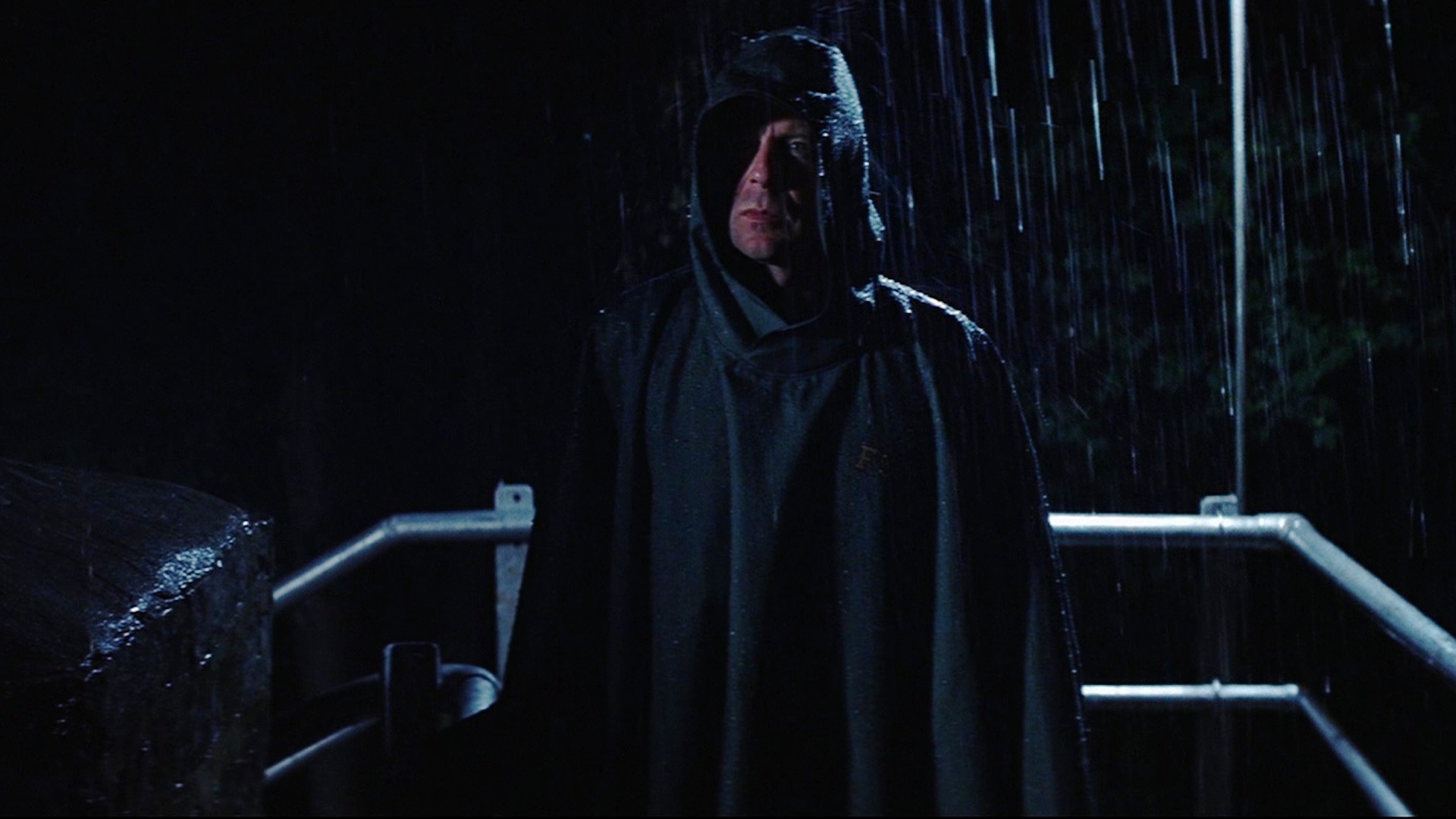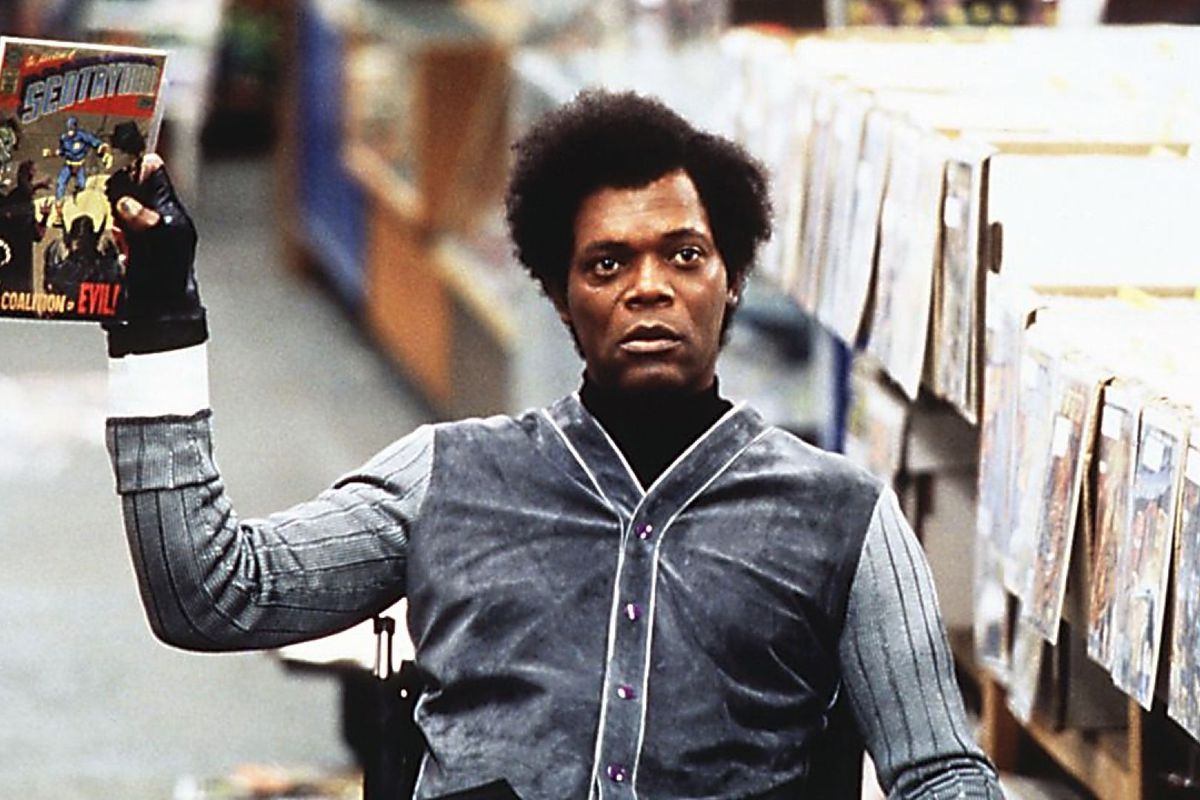Crew
Director/Screenplay – M. Night Shyamalan, Producers – M. Night Shyamalan, Barry Mendel & Sam Mercer, Photography – Eduardo Serra, Music – James Newton Howard, Visual Effects – The Secret Lab (Supervisor – Richard Hoover), Special Effects Supervisor – Steve Cremin, Makeup Effects – KNB EFX Group Inc (Supervisors – Howard Berger & Greg Nictotero), Production Design – Larry Fulton. Production Company – Blinding Edge Pictures/Touchstone.
Cast
Bruce Willis (David Dunn), Samuel L. Jackson (Elijah Price), Spencer Treat Clark (Joseph Dunn), Robin Wright Penn (Audrey Dunn), Charlayne Woodard (Elijah’s Mother)
Plot
Security guard David Dunn is the only survivor of a train crash just outside Philadelphia and miraculously emerges with not a scratch on his body. Afterwards, David is contacted by comic-book art dealer Elijah Price who asks David if he has ever experienced any injury or illness in his life. David realizes he has not, despite having been in hotel fires and car crashes. Price tries to persuade David that he is in fact a superhero, just as in comic-books. Price argues that comic-books tell mythic truths about the world, that David has a unique genetic inheritance that grants him invulnerability, among other powers, and that these powers can be turned toward the good of humanity.
The pre-publicity for Unbreakable made it one of the most eagerly anticipated films of the year. First, there was the name of M. Night Shyamalan whose previous credit – as the director/writer of the unexpected runaway success of The Sixth Sense (1999) – alone provided Unbreakable with a sense of must-see expectation. And then there was the trailer, which created a fascinating mystery with Bruce Willis waking to find a doctor asking him why he has survived a train wreck without a scratch on him and then Samuel L. Jackson asking: “The purpose of your whole life has led up to this moment. Do you want to know what that purpose is?”
This set-up the fantastic idea of a man on the verge of a crucial conceptual breakthrough about what the meaning of life was. The publicity machine made every attempt to make the revelation of the secret a closely guarded secret, hoping to suggest to audiences that this would be something on the order of The Sixth Sense‘s grand climactic reversal of assumptions, and that people would come to watch on the association of the M. Night Shyamalan name and the expectation of another such twist capper. Any more information than what was in the trailer – even the briefest synopsis of what Unbreakable was about – was kept a closely guarded secret right up until the film’s release.

The big surprise of course is – and do not read this if you don’t want to have it spoilt for you – is that Unbreakable is a film about comic-book superheroes. When one first read this, the response was “Huh!” When I read this in an opening-day review before seeing the film, the notion seemed bizarrely laughable. And once at the realisation that it is a superhero film, the only real surprise about Unbreakable is that this is what it is about. Certainly, in video/dvd and cable release and with the details of its plot is known, the film holds no surprises. There is an interesting final twist but no grand climactic overthrowing of audience expectations as in The Sixth Sense – the story is only a linear progression toward the hero’s coming to understand his destiny.
M. Night Shyamalan’s films are extraordinarily quiet films. Dialogue is hushed and even the silences hold one enrapt. In these silences, Shyamalan is capable of evincing a superb intimacy to his characters. However, this is an approach that is almost entirely opposed to the comic-book and the superhero, which are usually told in larger than life terms and moral absolutes. Unbreakable is more of a soul of the superhero film.
The superhero with brooding inner psychosis became fairly much de rigeur after Batman (1989) but instead Shyamalan renders his superhero’s inner life in kitchen sink terms – Bruce Willis’s superhero is an ordinary man whose weight in saving the world is contrasted with his trying to piece his failing marriage back together and find a better job. Unbreakable comes entirely free of any classic superhero elements. The most superheroic Bruce Willis’s stunts ever become are ripping the door off a car and lifting a set of barbell weights (that are in fact much less than the amount lifted by most professional bodybuilders). The closest we come to a superhero costume is seeing Bruce Willis in a hooded plastic raincoat with the word Security on it, which Shyamalan consciously crafts into something like a Batman-esque shadowy avenger in a couple of shots.

Unbreakable is similar to The Sixth Sense in many ways – M. Night Shyamalan again shoots it in Philadelphia, he again features Bruce Willis and a crucial element of the story is the well-etched relationship between Bruce and a young boy. Unbreakable is certainly well written and directed. The trouble with it though is M. Night Shyamalan’s kitchen sink approach – the very ordinariness and determined lack of larger-than-life affect results in a film that promises to build to something epical and grandiose in concept but leaves one unsatisfied and waiting at the end. One keeps wondering if the classical comic-book approach might not have suited the film better. The scenes with Samuel L. Jackson explaining his theories to Bruce Willis about his being a superhero and comic-books being a mythic form that relays universal truths seem quite ridiculous when you think about them. However, the very drabness of the M. Night Shyamalan’s kitchen sink approach is one that almost defies you to laugh at it – but the more you think about the film afterwards, the less you can help doing so.
Bruce Willis’s character makes a surprise appearance at the end of Shyamalan’s split personality thriller Split (2017). Shyamalan has confirmed that James McAvoy’s split personalitied character was originally intended as part of the script for Unbreakable. McAvoy, Willis and Samuel L. Jackson’s characters all met up in Glass (2019).
M. Night Shyamalan next went onto make the equally downbeat, minimalised and disappointing alien invasion film Signs (2002) and then the likes of The Village (2004), Lady in the Water (2005), The Happening (2008), The Last Airbender (2010), After Earth (2013), The Visit (2015), Split (2017), Glass (2019), Old (2021), Knock at the Cabin (2023) and Trap (2024). Shyamalan also produced and conceived the story for The Night Chronicles 1: Devil (2010) and produced the tv series’ Wayward Pines (2015-8) and Servant (2019-23) and his daughter’s directorial debut with The Watchers (2024). Through most of these run M. Night Shyamalan’s familiar themes of predestination, a greater truth that exists between works of fiction and of characters coming to understand the true purpose of their lives.
Trailer here


